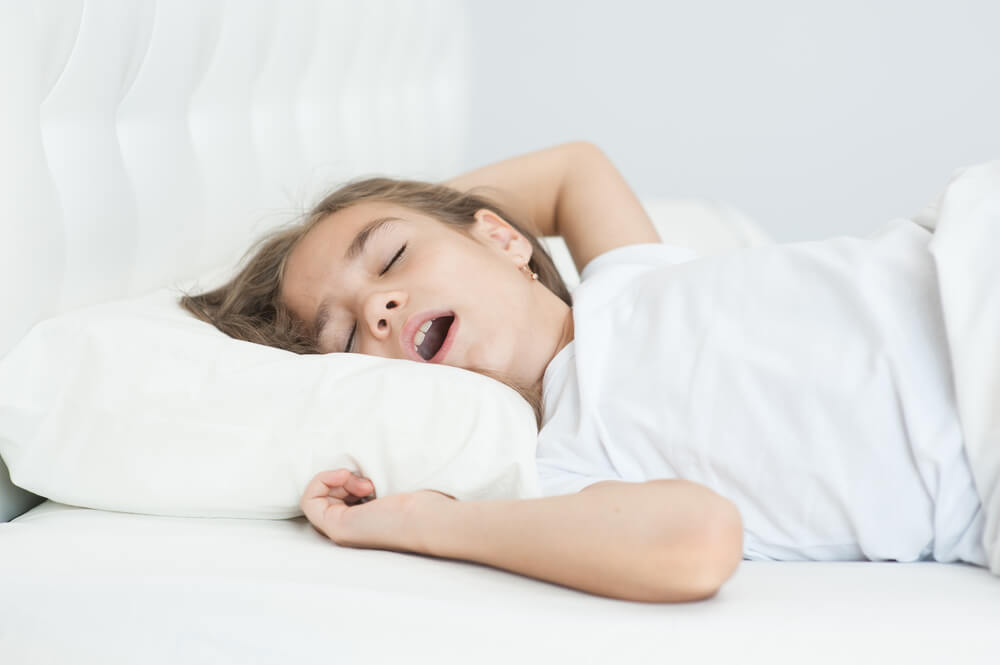While most instances of mouth breathing in children might be due to something as simple as a congested nose or allergies, which will quickly clear up, children who are continuous mouth breathers may experience issues such as:
- Irritability
- Crying Episodes
- Cracked Lips
Fortunately, there are various options for stopping mouth breathing in children, allowing you and your child to enjoy life to the fullest. This article will outline the causes of mouth breathing in children and advise parents on stopping mouth breathing.
Why Is Mouth-Breathing Bad For Kids?
Occasional occurrences of mouth breathing are usually nothing to worry about. Still, there are numerous negative effects of mouth breathing that can lead to lengthy orthodontic issues that might prove costly.
Mouth breathing in children can cause behavioral problems that extend to irritability, the inability to focus, and unwillingness to participate in activities during the daytime due to lack of sleep.
Constant exposure to the mouth breathing face posture can lead to an overall change in the shape of the face, but this only occurs if the symptoms aren’t caught early.
What Are the Causes of Mouth Breathing in Toddlers and Preschoolers?

To understand how to stop mouth breathing, parents must first know what causes the issue. Several underlying problems can explain the occurrence of mouth breathers, especially in children. One of the most common causes is a congested or blocked nose. Under normal circumstances, children will breathe through both their noses and mouth. However, when the nasal pathway is blocked, children are forced to solely mouth breathe.
A blocked nose can be caused by several issues. These include:
- Swollen Tonsils
- Simple Allergies
- Colds
In some cases, mouth breathing in children may result from the overuse of pacifiers or even thumb-sucking.
In other instances, the cause of mouth breathers may be due to a tight frenulum. This is often observed in children who experienced difficulties breastfeeding because they would not latch on. The tight frenulum interfered with ‘normal baby’ breathing, forcing children to breathe through their mouths to find relief.
Of all the causes listed, one thing is sure. Mouth breathing in children is usually easily correctable, but it is better to catch the condition early. Meaning next time your child is sleeping with their mouth wide open, you should pay close attention as you might be looking at a ‘mouth breathing face.’
In some cases, mouth breathing in children might even be a sign of sleep apnea. This is due to the child’s need for more oxygen than they can take in by only breathing through their nose. In such cases, observing this mouth breathing face and catching the condition early is paramount.
How To Spot Mouth Breathing In Children?
One of the best signs to indicate a more significant problem is simply the mouth breather’s face – children who sleep with their mouth open should be checked to see if they are breathing through their nose or mouth.
Restless sleep is another sign that your child might be mouth breathing. This is often accompanied by grinding of the teeth caused by issues while the child is trying to breathe normally.
Mouth breathing in children also leads to dry mouth, from which several issues might arise. Children who suffer from halitosis despite good dental care might indicate a mouth breathing problem. Mouth breathing can also cause cavities due to the lack of saliva needed to appropriately handle any germ build-up in the mouth.
Due to extended periods spent in the mouth breathing face posture, children might find it difficult to say certain words. So parents must note any speech impediments, especially cases where the reason for said impediment is not immediately noticeable.
How To Stop Mouth Breathing In Children

Parents who wish to learn how to stop mouth breathing in children must first identify the issue. Stopping mouth breathing in children depends heavily on how soon the problem is identified. In babies, the problem is usually easily treatable as they are too young to have developed a habit. Simply ensuring that the nasal passage is clean is usually enough to get babies back on track.
Adjusting breastfeeding postures to ensure that babies breathe more easily through their nose can remove any issue before it has a chance to become a habit.
Teaching older children to go long periods without depending on pacifiers or thumb-sucking for comfort leaves the nasal pathways free and clear, allowing natural respiratory habits to prevail.
Some children may resort to breathing primarily through their mouth due to stressors occurring at or around their bedtime. Ensuring that bedtime routines are calming and children are allowed to feel in control of their actions could remove any stressors contributing to the development of this habit.
Ensuring that children who suffer from allergies are properly treated is another way to encourage natural breathing patterns. In children who cannot cope with over-the-counter medications to remedy their allergies, a doctor’s visit should be scheduled to ensure that congestions don’t lead to more significant problems.
However, in cases where these remedies do not work, a quick visit to Dr. Hernandez-Puga can provide parents with the tools they need to rectify the issue.
Children who are a little older might be more challenging to treat, and it is recommended that parents bring their children in for a visit to ensure that the diagnosis they believe is actually the problem at hand.
Suppose your child has experienced any of the issues highlighted in this article. In that case, if they are sleepy, cranky, experiencing an onset of bedwetting with seemingly no rhyme or reason, they might not be breathing correctly, especially at night. Trying to rectify this problem on your own might be difficult. Instead of attempting the journey to recovery with no support, contact our office.
Dr. Ana will quickly and efficiently identify the problem and provide parents with the knowledge to treat the issue and treat any lingering symptoms the case might have caused.
All it would take to ensure your child is healthy and happy is a phone call and a visit. Our team is waiting to help. Schedule a consultation, now.




